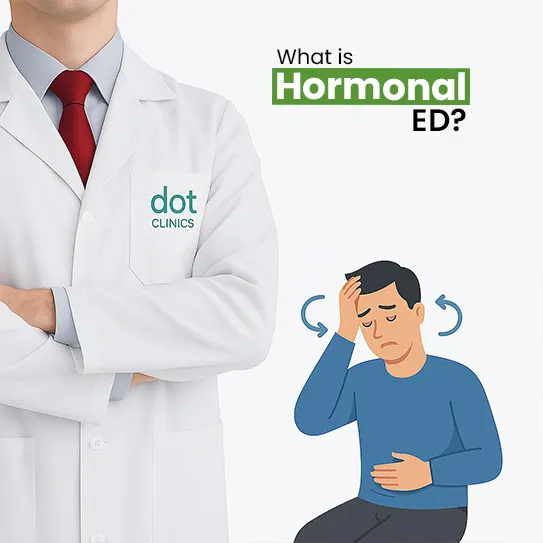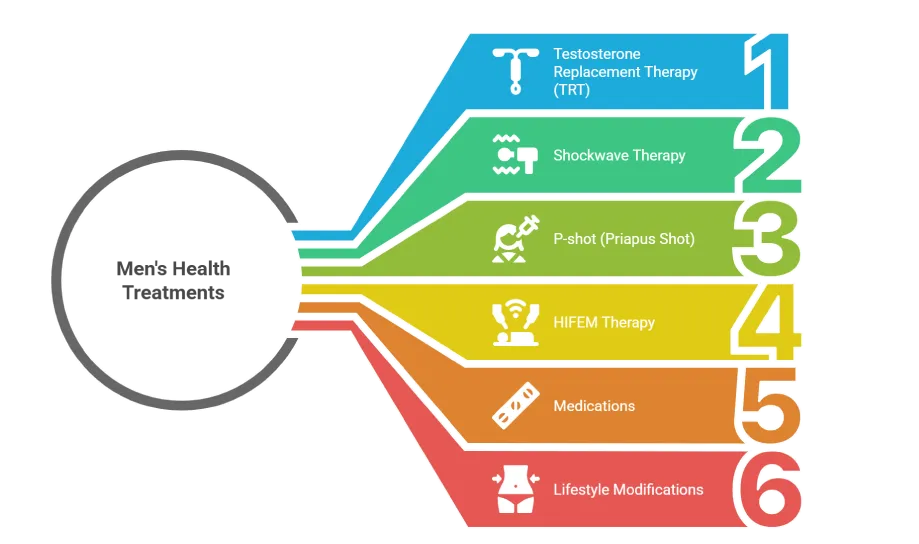
Hormonal Erectile Dysfunction Treatment
Treatment For Erectile DysfunctionDot Clinics provide expert hormonal treatments to tackle ED caused by imbalances. Our tailored approach supports healthier sexual function and renewed self-confidence.

What is Hormonal Erectile Dysfunction?
Hormonal erectile dysfunction arises due to imbalances in sex hormones level, especially testosterone, which disrupts the normal mechanisms that facilitate an erection. Testosterone, the primary male sex hormone, is crucial for sexual desire, erection firmness, and overall sexual performance. When testosterone levels drop, it can lead to decreased sexual activity and challenges in achieving an erection sufficient for sexual intercourse.
Identifying and addressing the underlying hormonal imbalance is essential for restoring normal erectile function and overall sexual health.
Symptoms of Hormonal ED

Identifying hormonal imbalance symptoms in men is crucial for timely intervention:
- Reduced sexual desire
- Problem in obtaining or maintaining an erection
- Feelings of exhaustion and reduced energy levels
- Mood swings or depression
- Loss of muscle mass and increased body fat
- Less spontaneous erections, such as morning erections
Causes of hormonal ED
- Low testosterone declines erections quality and sex drives.
- Enhanced prolactin levels reduce testosterone production and cause sexual dysfunction.
- Problems with the thyroid have an impact on sexual health.
- High LH can indicate issues in the testicle, low LH points to low testosterone level.
- Too much testosterone boosters can upset hormones and make sexual dysfunction worse.
- Underlying conditions like heart disease may also contribute to sexual impotence.
Diagnostic Approaches
At Dot Clinics, our approach to understand what may be causing your erectile dysfunction is simple yet thorough:
- Medical Condition and Sexual History - We do comprehensive discussion on your medical history and sexual activities to understand your symptoms of erectile dysfunction and potential hormonal factors.
- Physical Exam - We examine signs such as low body hair or small testicles that can show hormonal imbalances.
- Blood Tests - Your blood will be tested for hormone levels such as testosterone, LH, prolactin, thyroid, and estrogen to discover their influence on your sexual health.
This clear, step-by-step process helps us make the best treatment plan to improve your sexual functioning and quality of life.
Treatment Options for Hormonal ED

At Dot Clinics, we offer advanced treatments that restore hormonal balance and modify sexual health naturally and effectively.
- Testosterone Replacement Therapy (TRT)
Dot Clinics offer Testosterone Replacement Therapy which is helpful for men whose testosterone levels are immersed below optimal. Testosterone is the primary male sex hormone that runs everything from libido to mood and even erection quality. When it is low, it takes a hit. TRT works by restoring your testosterone levels in a healthy and functional range.-
What happens when you start TRT?
- Erectile function or quality of erection improves, especially morning erections.
- Libido typically returns within weeks.
- Mental clarity, focus, and confidence increase.
- Fatigue decreases, and many men feel like themselves again.
-
We offer TRT in several easy-to-manage formats:
- Injections (done weekly or bi-weekly) are fast-acting and effective.
- Topical gels or patches are applied daily and absorbed through the skin.
- Pellet implants (placed under the skin) provide steady testosterone for 3–6 months without daily effort.
TRT only works if you actually have low testosterone. That's why we do comprehensive blood work to confirm hormonal imbalances before starting any treatment.
- Shockwave therapy:
Shockwave Therapy for ed, is another advanced method provided by Dot Clinics. It is a completely safe option that uses acoustic waves to encourage the growth of new blood vessels in penile tissue.-
Here’s what shockwave therapy does:
- Accelerates blood flow to the penis for strong and firm erections.
- Regenerate erectile tissue which is damaged by age or chronic conditions.
- Can activate Leydig cells (which help produce testosterone) and slightly elevate natural hormone levels.
- Has cumulative benefits over multiple sessions, not just a one-off effect.
It’s particularly effective when vascular issues and low testosterone overlap, which is common. Many patients with erectile dysfunction experience noticeably stronger penile erections after a few sessions, especially when paired with TRT.
- P-shot (Priapus Shot):
PShot or Priapus Shot which is one of the most innovative and natural enhancement treatments available at Dot Clinics. It uses your own blood, spun to concentrate platelet-rich plasma (PRP) which is the part of your blood abundant in growth factors.-
How it Works:
- PRP is injected into specific areas of penis.
- It stimulates the repair of tissue, nerve regeneration, and sensitivity.
- Over time, it can increase the quality of perseverance, longevity and erection.
Although P-shot doesn't directly treat hormonal imbalance, it amplifies the benefits of TRT and promotes better function by enhancing tissue health and nervous response.
- HIFEM (High-Intensity Focused Electromagnetic) Therapy:
HIFEM for hormonal ed aims at activating the pelvic floor muscles with powerful electromagnetic pulses. The stronger pelvic muscles somehow have no effect on testosterone levels; their assistance on hormonal treatment increases erection strength, control, and endurance. - Medications:
Doctors at Dot Clinics prescribe oral medications that are PDE5 inhibitors, such as Viagra, Cialis, and Levitra. These calm the smooth muscle and enhance blood supply to the penis to help in achieving and maintaining the erection. For men with normal testosterone levels, PDE5 inhibitors alone can be effective. At Dot Clinics, we use these medications strategically often as a bridge while hormonal therapies take effect or in combination for enhanced results. - Lifestyle Modifications:
At Dot Clinics, we emphasize the power of lifestyle in supporting hormonal health. Exercising and lifting weights encourages natural testosterone production, while rest supports the normal hormonal rhythm. Balanced food, and that includes meals with abundant of zinc and healthy fats, is crucial for hormone synthesis. High cortisol, as a result of too much stress, is critical because it kills testosterone.
We render personalized support services to assist patients in combining these healthy habits with medical treatments as the results are more sustainable when a holistic approach is taken.
Why Choose Dot Clinics?
- We provide a supportive, non-judgmental environment for detailed, open and honest discussions about your sexual life.
- Dot clinics make tailored strategies based on your specific medical and personal needs.
- Latest evidence-based therapies are offered at Dot Clinics by experienced healthcare professional.

Please consult with our physician for diagnosis and treatment.
FAQ's
No, there are multiple reasons people could have ED such as performance anxiety, poor blood circulation or the medications you are taking. Hormones are a common cause of ED.
Yes, elevated estrogen levels can inhibit the production of testosterone and this can mean a diminished libido, less sexual desire and erections insufficient for sexual activity.
TRT is a treatment of erectile dysfunction that relevels testosterone by injection, gels, patches or pellets and resets normalcy and improves sexual function.
Sex drive and the strength of the erection are controlled by testosterone. In cases where testosterone is very low, most men would not be willing to have sexual intercourse and they will also be unable to reach an erection or maintain it.
Doctors gather information about your health and sexual history, do a physical exam, and conduct blood tests to check for hormone level. Additional tests can be ultrasound or others if necessary.



